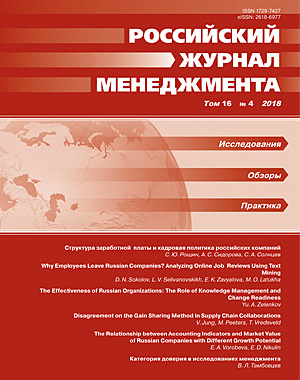Disagreement on the Gain Sharing Method in Supply Chain Collaborations
DOI:
https://doi.org/10.21638/spbu18.2018.404Аннотация
Due to a constantly growing competition among organizations and higher customer expectations, in the course of the last decades companies started to realize the need for supply chain collaboration (SCC). However, setting up a coalition is often challenging for collaborative parties. One major challenge for the implementation and success of a collaboration is a fair allocation method, which is accepted by and satisfies all collaborative parties. Although researchers already outlined the importance of the parties’ acceptance of the gain sharing method, until now the actual acceptance levels of gain sharing methods have not been investigated. This paper fills this gap by investigating the acceptance levels of selected gain sharing methods in vertical three-echelon SCCs in the Dutch fast moving consumer goods (FMCG) industry. In addition, the influence of behavioural decision-making aspects on the acceptance of allocation methods is observed in order to explain the cause of the acceptance or rejection of the gain sharing method. Results indicate that the acceptance of a gain sharing method depends on the information availability and cognitive biases. Furthermore, due to a different influence of available information and varying cognitive biases, no allocation method is accepted by all collaborative parties. Practical implications include to provide each party individually all relevant information to increase the parties’ acceptance and to apply debiasing techniques to make the decisions more predictable.
Ключевые слова:
supply chain collaboration, gain sharing, behavioural decision-making
Скачивания
Библиографические ссылки
REFERENCES
Загрузки
Опубликован
Как цитировать
Выпуск
Раздел
Лицензия
Статьи журнала «Российский журнал менеджмента» находятся в открытом доступе и распространяются в соответствии с условиями Лицензионного Договора с Санкт-Петербургским государственным университетом, который бесплатно предоставляет авторам неограниченное распространение и самостоятельное архивирование.





